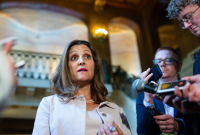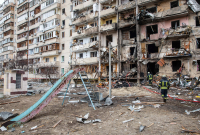Support strong Canadian climate journalism for 2025
This story was originally published by Yale Environment 360 and appears here as part of the Climate Desk collaboration.
Volkswagen might as well hang a “sold out” sign on the doors of its European and U.S. factories. The world’s second-largest manufacturer of electric automobiles announced last month that any plug-in ordered after May won’t find its way to customers’ garages before 2023. The German carmaker’s sales of nearly 100,000 battery electric models in the first quarter landed it behind only Tesla, but far from the pace needed for the 700,000 it planned to roll off its assembly lines this year. And Tesla, too, like almost all other EV automakers, says it is highly unlikely to hit 2022’s sales targets.
Carmakers such as Volkswagen and Tesla say they face multiple problems, including the Chinese economy’s airtight COVID lockdown, which has stifled China’s demands for new electric vehicles. But closer to home in Europe, the looming obstacles have much to do with the fallout from the Russian invasion of Ukraine and Russia’s role as a major supplier of the metals needed for EV batteries, as well as for the entire renewable energy sector, from wind turbines to solar panels.
The war in Ukraine — coupled with continuing COVID supply chain disturbances, logistics bottlenecks, and soaring global inflation — has reversed a decade of falling prices in the green tech sector. And that reversal threatens to set back the global rollout of low-carbon technology.
Russia has not cut off its export of the metals needed for the green energy sector, but Britain has imposed tariffs on imports of some Russian metals as a result of the war. And the spectre of additional tariffs being imposed by the European Union — thus far blocked by Germany — hangs over an already hobbled renewables sector unable to meet surging demand eight months after the bloc set a goal of reducing greenhouse gas emissions by 55 per cent by 2030.
According to Barron’s, the price of electric car battery metals has jumped by 50 per cent since Russia invaded Ukraine on Feb. 24. And price increases in raw materials and the threat of disruptions come at a time when Europe is working to speed up the green energy transition and break its heavy reliance on Russian oil and natural gas. EU leaders recently agreed to cut off 90 per cent of Russian oil imports by the end of 2022.
Europe, a raw materials pauper, imports more than $7 billion of metals, rubber, and minerals a year from Russia, including nickel, palladium, lithium, platinum, cobalt, neon gas, aluminum, and copper. These are all vitally important for the batteries, electric cars, solar panels, smart grids, and wind turbines needed to tackle climate change. For example, Norilsk Nickel — owned by Vladimir Potanin, a key Putin ally and one of Russia’s original oligarchs — is the world’s largest producer of high-grade nickel, mined in Siberia, and also trades in palladium, cobalt, and copper. Russia supplies Germany with 39 per cent of its nickel — which is used in car batteries — and much of that comes from Norilsk Nickel.
“This degree of dependency on [Russia for] some materials is really quite alarming,” says Vasileios Rizos, head of sustainable resources circular economy at the Centre for European Policy Studies, a think tank based in Brussels. “It has accelerated a search already underway to diversify and replace Europe’s sources for these raw materials. In no way is it sustainable in the long run, with Putin or without.”
Thus far, only the U.K. has added any metals to its sanctions list, last month announcing that it would levy a 35 per cent import tariff on $2 billion of Russian goods, including large quantities of platinum and palladium. The rationale is the same as for other sanctioned commodities, such as oil, namely to “inflict further damage on the Russian war machine,” explained British Secretary of State for International Trade Anne-Marie Trevelyan.

The EU has already announced import bans on Russian coal, oil, caviar, wood, rubber, cement, and vodka. Until now, though, metals have had a free pass — for the simple reason that they are essential for everything from smartphones to airplanes. As with Russian natural gas, trade is flowing moderately well despite the impediments.
Europe’s renewables sector is watching events closely, already concerned about the rising prices and market disruptions. Some experts, like Volker Quaschning, a professor of renewable energy systems at HTW Berlin University of Applied Sciences, say metals sanctioning is overdue.
“We simply cannot contribute to the financing of the war by purchasing raw materials of any kind from Russia,” he says. “If there are bottlenecks, the government must, if necessary, allocate raw materials. In other words: Use the available raw materials first where it is most urgent to overcome the crises.”
The heads of leading electric vehicle manufacturing companies are, not surprisingly, opposed to sanctioning Russian metals, saying it will be a serious blow to efforts to transition away from fossil fuels. “We need the energy, we need the charging networks, we need the infrastructure, for sure, we need the cars, but we also need the batteries and the raw materials,” Volkswagen chief executive Herbert Diess said last month.
Europe’s clean tech sector is now scrambling for non-Russian suppliers of key raw materials; but as it does, the EU finds itself in an uncomfortable moral dilemma. Many of the markets that can cover rising European demand for these raw materials are controlled by other authoritarian regimes — including China, the Democratic Republic of the Congo, and Zimbabwe — that have grave human rights records themselves.
As Europe’s Green Deal lurches forward, the bloc’s demand for metals used in renewables is projected to increase in the near future — in the case of nickel and cobalt, by two and three times, respectively.
“In terms of the metals that renewable technology needs, Russia is a very big factor, in Europe but worldwide, too,” says Klaus-Jürgen Gern, an economist at the Kiel Institute for the World Economy in Germany. “The impact of a stoppage of a major export metal, such as nickel or palladium, would cause an industrial recession in the Western world. Even when a certain share of a Russian metal import looks rather small, like copper for example, a complete cutoff would send prices shooting up and world markets into turmoil.”
Russia is a significant exporter of many of the metals and gases used in battery production (lithium, cobalt, and nickel) as well as palladium, which is essential to manufacture catalytic converters — the devices required for reducing exhaust emissions. Platinum, palladium, and iridium are components in fuel cells and electrolyzers, technologies in the hydrogen economy. And rare-earth elements, another Russian export, can be found in permanent magnets, essential for wind turbine generators and electric-vehicle traction motors.
Turbines and solar panels require aluminum, copper, and silicon, while semiconductors, or computer chips — critical for EV batteries — involve production processes using Ukrainian neon gas. (Before the war, Ukraine had supplied half the world’s and more than 90 per cent of the U.S.'s semiconductor-grade neon. Two Ukrainian factories — one in Mariupol and the other in Odessa — that supply most of the world’s neon gas have closed as a result of the war.) Also, a fifth of uranium for Europe’s nuclear reactors comes from Russia.
The war has already contributed to the reversal of the downward price of clean tech, such as lithium-ion batteries for EVs and utility-scale electricity storage. The price of lithium has shot up two-and-a-half times this year, on top of all-time-high prices last year. The price of cobalt is at record levels. The soaring cost of nickel and neon gas are factors causing the electric vehicle sector to predict higher prices of as much as $3,000 per vehicle.
The accelerating EU transition away from Russian fossil fuels would require doubling photovoltaic and wind capacities by 2025 and tripling them by 2030. That translates to the manufacture of 3,000 new wind turbines a year. And the EU would have to triple its electricity storage capacity by 2030 to support a renewables-based system. The production of electric cars is projected to shoot up from the current 1.3 million vehicles a year to between 6.5 million and 11.9 million by 2040.
Tobias Gehrke of the Royal Institute for International Relations, an independent think-tank based in Brussels, argues that severe supply shortages of these raw materials in the coming months constitute “a strategic threat to EU economic security [and] the EU’s capacity to deliver on its transformative green and digital ambition.“
In order to zero out its emissions by 2050, the EU would require around 35 per cent more copper and aluminum than it consumes today and around 45 per cent more silicon — a key component in solar panels that is also mined by Russia. Currently, Russia supplies 41 per cent of the EU’s palladium, 17 per cent of its aluminum and nickel, 16 per cent of its platinum, seven per cent of its copper, five per cent of its cobalt, and four per cent of its lithium.
Some experts, like Hans-Josef Fell of Energy Watch Group, a German think tank, say banning imports of Russian metals would undermine the sanctions on Russian fossil fuels, which total more than 13 times all Russian metal exports.
“I’m against a boycott because then Europe will be less prepared to weather the boycott on fossil fuels, which will have a devastating impact on Russia,” Fell says. In light of sky-high gas and oil prices and a pending EU embargo on most Russian oil, he argues, the last thing that the renewables industry needs is restricted access to raw materials.
Better than embargoes, says Gern, are the kind of tariffs that the U.K. has slapped on palladium and platinum. This way, he says, if Russia opts to keep up exports, British manufacturers can continue production while Russia pays a heavier price. If Russia decides to drop U.K. sales, the producers would have to obtain these metals elsewhere, which, says Gern, represents the kind of diversification called for anyway.
In addition to new sources abroad, European experts contend that Europe itself can mine more raw materials than it currently does. The EU’s circular economy experts also say that Europe should begin weaning itself off metal imports by recycling much of its existing stock.
None of these strategies, however, will in the short term provide the likes of VW and Tesla with the materials they need to put new electric vehicles in dealership windows at the rate that ever-more consumers are demanding.






Comments
"The war in Ukraine . . . has reversed a decade of falling prices in the green tech sector. And that reversal threatens to set back the global rollout of low-carbon technology."
Um, yeah, that might be true if the war in Ukraine hadn't also multiplied the cost of fossil fuels. If you have competing products thing A and thing B, and thing A is suddenly one and a half times as expensive, while thing B is suddenly three times as expensive, which one is gaining and which one is losing?
People really need to think for two seconds when they're making forecasts.
Being able to raise Europe from 6% electric cars to 8%, in the next year, instead of 7%, would mean 1% of the oil used in cars, a fraction of a percent of all oil, could be not-purchased from the Russians.
If 1% of Russia's oil revenue is greater than the revenue from the minerals, then letting the minerals be purchased is a win on Russia. If 1% is less, then restrict the minerals. We can impoverish the killers more by not-buying their metals than not-buying their oil.
My calculation here is to ignore every other effect (the happiness of the car factories, the greens) except hurting Russia.
China produces 4% of the world's nickel, and uses over 50%.
The US produces about 1/2%, and uses over 8%.
Canada produces about 7% and uses a very small proportion of what it produces. So there's no reason at all for any green industry to be going begging for nickel.
The car producers can't have it both ways: either they don't have the resources to make the vehicles they've committed to, or they don't have a big enough market (Chinese people aren't ordering) ... but they can't have it both ways.
To me, it's all excuses, excuses, excuses.
"Some experts, like Hans-Josef Fell of Energy Watch Group, a German think tank, say banning imports of Russian metals would undermine the sanctions on Russian fossil fuels, which total more than 13 times all Russian metal exports."
So how does not buying apples mean that not buying oranges, too, will undermine the boycott of apples?
Maybe there's a connection, but it's certainly not obvious. Maybe the author could elaborate, if he can clarify.